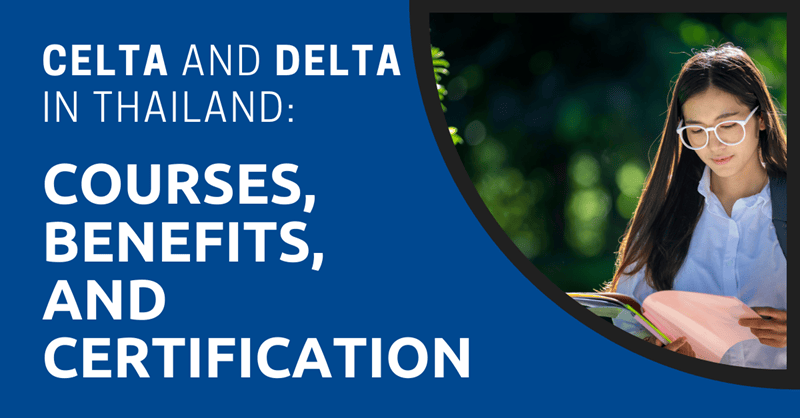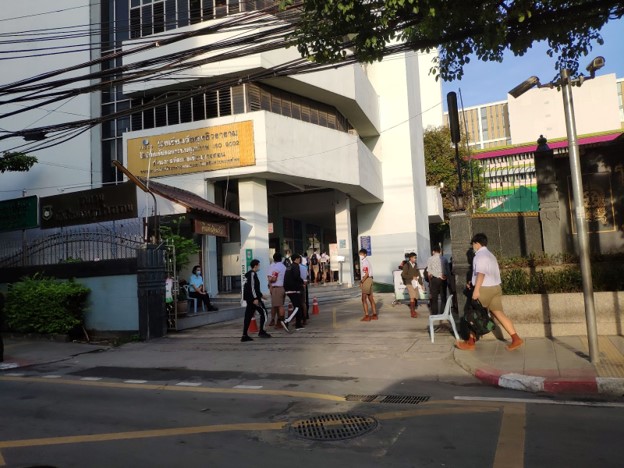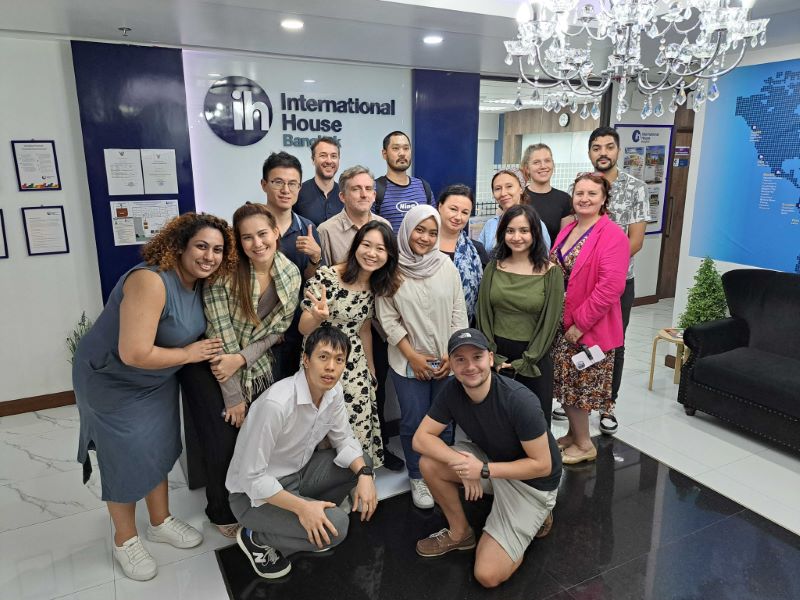
Teaching English is a highly popular option for many expats who want to stay long-term in Thailand. With hundreds of language schools, English programs and private tutoring jobs available, there’s no shortage of opportunities.
Most schools in Thailand will accept a bachelor’s degree and 120-hour TEFL certificate as qualifications. However, for those who are thinking of making a career out of teaching English as a second language (ESL), a better option might be Cambridge’s widely-recognised CELTA and DELTA qualifications. The good news for those already in Thailand is that both can be taken right here!
In this article, we’ll explain everything there is to know about taking the CELTA/DELTA in Thailand. We’ll show you where you can take it, how much it’ll cost and how the courses compare to the standard TEFL certificates out there.
"*" indicates required fields
Disclaimer: This article may include links to products or services offered by ExpatDen’s partners, which give us commissions when you click on them. Although this may influence how they appear in the text, we only recommend solutions that we would use in your situation. Read more in our Advertising Disclosure.
Contents
What are CELTA and DELTA?
CELTA (initially standing for Certificate in English Language Teaching to Adults) and DELTA (initially standing for Diploma in English Language Teaching to Adults) are two English language teaching certificates offered by Cambridge Assessment English, a non-teaching branch of the famous Cambridge University.

In recent years Cambridge have slightly renamed the courses to Cambridge English Level 5 Certificate in Teaching English to Speakers of Other Languages and Diploma in Teaching English to Speakers of Other Languages, but confusingly kept the previous acronyms (presumably because they sounded a little catchier than CEL5CTESOL and DTESOL).
CELTA
CELTA has been around for over 30 years, and over that time has garnered a strong reputation.
The UK’s Ofqual (Office of Qualifications and Examinations Regulation) has designated CELTA as a Level 5 course, meaning it provides professional-level skills and is recognised globally as an English language-teaching qualification.
The course takes around 4 to 5 weeks to complete, with a heavy focus on practical teaching (candidates are expected to complete 6 hours of practice teaching as part of their certification).
DELTA
The DELTA is an even more intensive course, intended for experienced and qualified teachers to hone their craft and move up into more experienced and/or senior positions.
It’s a Level 7 qualification according to Ofqual, which means it is considered the same standard as a Master’s degree.
The DELTA is spread over three modules, consisting of
- A written exam
- Reflective teaching practice
- A research paper
The modules can be completed in any order, although Modules One and Three both have hard deadlines.
Why Get CELTA/DELTA Qualified?
There are several good reasons to take the CELTA or DELTA for teaching English in Thailand.
These include:
- Globally Recognized Certification: According to the British Council, a CELTA certificate is required for 3/4 English-teaching jobs worldwide. Although you’re less likely to need it in Thailand (as opposed to a standard degree or TEFL course), it’s still useful to have a certificate you know will open doors for you wherever you are.
- Heavy Practical Focus: With the CELTA certificate requiring six hours of teaching practice, there’s a heavy focus on gaining real-world experience over textbooks and online fill-in-the-blank activities. You’ll feel a lot more confident stepping into a classroom knowing you have some experience under your belt.
- Become a Better Teacher: Even if you’re an experienced ESL teacher, completing a course like the DELTA gives you a great opportunity to reflect on your practice and to enhance and develop your skills – all of which will be looked upon very favourably by potential employers.

Requirements
In order to enrol on a CELTA or DELTA course, you’ll need the following:
CELTA Requirements
- Be 18 years or above (although you may struggle to get hired in a teaching job if you’re under 20)
- Have graduated high school (diploma/A-Levels or equivalent).
- Be either a native English speaker or able to demonstrate a native or near-native grasp of English (e.g with a 7.5 or above IELTS score).
You do not need to have completed a bachelor’s degree to qualify for the course – however, you may struggle to find teaching work in Thailand later without one.
To apply, you’ll need to visit the website of a CELTA course provider (see below) and complete an application form.
You may then be sent some pre-interview tasks to complete in order to gauge your English capability.
Once you’ve completed these successfully, you’ll then need to complete an interview with your course tutor. After which – with a little luck – you’ll be enrolled!
DELTA Requirements
DELTA requirements are slightly higher than CELTA since you need to have at least one year of teaching experience.
- Be 18 years or above.
- Have graduated high school (diploma/A-Levels or equivalent) – some courses may require a degree, but not all.
- Be either a native English speaker or able to demonstrate a native or near-native grasp of English (such as a CEFR C1).
- Have at least one year of teaching experience, preferably in English-language education.
To apply, you’ll need to contact your local provider and get an application pack.
You’ll likely need to include your CV, qualifications and references and complete pre-interview tasks. You’ll then need to complete an interview with your course tutor.
Where to Get CELTA/DELTA Certified in Thailand
International House are the only official providers of CELTA and DELTA courses in Thailand, which makes a certain amount of sense as IH were the original creators of the CELTA Course way back in the 1960s (before Cambridge took it over in the late-80s).

They are currently based in the Nana neighbourhood of Bangkok, a short walk from the BTS station.
IH offer plenty of routes to getting your CELTA/DELTA certificate. You can complete the course fully face-to-face, fully online or a blend of the two.
Here is the breakdown of your options:
CELTA Options in Thailand
Face-to-Face
The face-to-face course takes place in the Sukhumvit area of Bangkok, and consists of around 120 contact hours. You can choose to take the course full-time (in which case it’ll take four weeks) or part-time (which will take ten weeks).
Included in those 120 hours are both 6 hours of assessed teaching practice and 6 hours of direct lesson observations. The face-to-face course costs US$1750 (around THB65000)
If you’re travelling to Thailand to take the course and are not already based here, IH also offer accommodation at reduced rates through their website, with your choice of rooms ranging from clean-but-basic for US$500 per month, all the way up to swish and swanky for US$1300 per month.
Online
IH also provide the option of taking the CELTA course entirely online. Upon completion, you’ll receive the same certificate you would have received on the face-to-face course.
The online course consists of online assignments, live tutorials, plus remote observations and teaching practice sessions with real students, with everything taking place via Moodle and Zoom.
Like the face-to-face course, you can opt for an intensive four-week full-time course or a less-intensive ten week part time course, with both options also costing US$1750.
DELTA Options in Thailand
As stated above, the DELTA course is split up into three modules. These modules can be completed in any order and at any time, but you do need to complete all three to qualify for a certificate.
Module One
Module One of the DELTA focuses on developing the teacher’s knowledge and understanding of teaching and learning English, culminating in two 90-minute written exams. The exams take place twice a year (in June and September).
Like the CELTA, Module One can be taken face-to-face at IH’s offices in central Bangkok or entirely online. Both take two intensive weeks to complete full-time, or can be taken part-time over 10 weeks.
The full-time course (both online and face-to-face) costs US$1100 (around THB40,000). You’ll also need to pay an assessment fee to Cambridge, which costs around £151 (around THB7000), which is not covered by your tuition.
Module Two
Module Two focuses on developing the teacher’s practice. Assessment is via a portfolio of coursework which includes a professional development assignment, background essays and assessed teaching practice.
You’ll also need to prepare, teach and evaluate four lessons, one of which is assessed by an external Cambridge assessor.
Like Module One, Module Two can be taken either full-time or part-time, face-to-face or fully online. The face-to-face course takes six weeks to complete, while the part-time course takes fifteen weeks to complete. Both cost USD2800 (around THB100,000).
Note that the full-time course can only be taken face-to-face, while the part-time course can only be taken online.
Like Module One, you’ll also need to pay an assessment fee of £188 (around THB8700).
IH also offer an additional ‘Pre-Module 2’ course for teachers who may feel a little disoriented with all the work Module Two requires.
Module Three
Module Three is focused on extending practice and English Language Teaching (ELT) specialism. Assessment is via an extended written essay of 4000 to 4500 words, which can be submitted twice a year (in June or December), either through a test centre like IH or directly to Cambridge.
As the focus of Module Three is the written essay, IH do not offer a face-to-face component for this part of the course – only an online course. The Module Three course takes 12 weeks to complete and costs US$500 (around THB18,000), plus an additional assessment fee of £105 (THB4800).
IH also offer an extra ‘Insight Into Module Three’ programme for free for those already enrolled on to Modules One and Two (the course usually costs US$150).
Courses Breakdown and Prices
With so many options available for different courses, things can quickly get confusing.
Here’s a quick breakdown of what IH offer and for how much:
| Course | Full-Time/Part-Time | Length | Cost (USD) | |
| CELTA | Face-to-face | Full-Time | 4 weeks | US$1750 |
| Part-Time | 10 weeks | US$1750 | ||
| Online | Full-Time | 4 weeks | US$1750 | |
| Part-Time | 10 weeks | US$1750 | ||
| DELTA | Module One (Face-to-Face) | Full-Time | 2 weeks | US$1100 |
| Part-Time | 10 weeks | US$1100 | ||
| Module One (Online) | Full-Time | 2 weeks | US$1100 | |
| Part-Time | 10 weeks | US$1100 | ||
| Module Two (Face-to-Face) | Full-Time | 6 weeks | US$2800 | |
| Part-Time | 15 weeks | US$2800 | ||
| Module Two (Online) | Full-Time | 6 weeks | US$2800 | |
| Part-Time | 15 weeks | US$2800 | ||
| Module Three | Full-Time | 12 weeks | US$500 |
Should I Get TEFL or CELTA/DELTA in Thailand?
If you’re an expat in Thailand thinking of taking up English teaching, you might be wondering what course is right for you.
Let’s break them down:
Recognition: As stated above, most schools in Thailand will accept either a TEFL or a CELTA in addition to a standard BA degree. However, the CELTA is globally recognized and considered a requirement in many English-teaching jobs globally, including China. CELTA has the edge here.
Skills and Experience: CELTA takes the lead on this one. With six hours of assessed teaching practice, six hours of direct lesson observations and peer observations, the practical element of the course is rigorous and intensive.
Location: IH are the only recognized providers of the CELTA and they’re based only in Bangkok, whereas there are TEFL courses available from other providers all across the country, including in Phuket, Chiang Mai and Hua Hin. If you’re looking to combine your certification with a few beach hours, TEFL is the clear winner.
Cost: A face-to-face, full-time CELTA with IH will set you back US$1750, while a standard TEFL course with a well-regarded company such as SEETEFL will cost you US$1395. TEFL is the one to go for if you’re on a tighter budget.
Job Opportunities: While the CELTA is more widely recognized, IH do not currently offer the ‘internship programs’ that many TEFL providers do – meaning you’re on your own once you’ve got your certificate. This is unlikely to be a problem for most people, but those who want the peace-of-mind of graduating with a guaranteed English teaching job in Thailand may prefer to take a TEFL course.
Salary: Generally speaking, starting salaries for English-teaching jobs are the same in Thailand whether you’re starting out with a TEFL or a CELTA – either is fine for most employer’s paperwork. There are a handful of language schools that insist on CELTA and offer marginally better salaries, but any difference is quickly mitigated by experience. This one’s a tie.
Related article: TEFL in Thailand: How to Get Certified and Recommended Courses
Now, on to You
If you’re serious about getting into English teaching as a career, you could do a lot worse than taking the CELTA (and later the DELTA).
They may cost a little more than a standard TEFL certificate, but with global recognition behind them you’ll be in a good position when it comes to applying for work.
However, if you’re thinking of getting into teaching as a means-to-an-end to stay long-term in Thailand, you might be better off saving your dollars and taking a TEFL.







